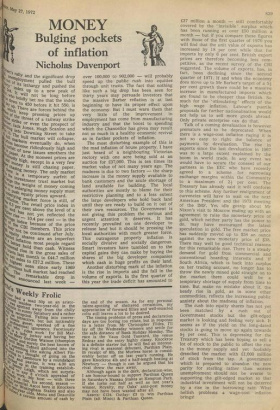MONEY
Bulging pockets of inflation
Nicholas Davenport
rally and the significant drop L4lerriployrnent pulled the bull ,,utit of its lethargy and pushed the 41rty. . 544. index up to a new ') eak of ilt , It will not be long before be ,„,11.0 boldly bet me that the index 'CiVb'n to 450 before it hit 550, is 111. There are forces behind the 4:"Lch keep pressing prices up Icii. f the threat of a railway strike t'rlite or even the prospect of Jack Jones, Hugh Scanlon and l'i? into Downing Street to take 4 kit' The htill market will collapse, .ceq Inarkets eventually do, when L oecorne ridiculously high and tfeit of new issues smothers the z'ulo'll`Tier. At the moment prices are 441 ,:, Y high, except in a very few er,,,:unney is still chasing paper, 414'4341g Money. The only market istil'e is a temporary rfeit of 11'e 4t.: investment ry trust market but Iltev the weight of money coming e tc,e,st enlarging money supply must 'Qiicie"11-Ish equity prices upward. ,410,ttrtig Market force is still, of Is The retail price index in aDer cent above the level of a 11RIte-11,11; has not yet reflected the 10,4 per cent — in the ,t at6.s index because of the price t th the CBI members. This Price be continued after July. i4jri,ItIttY shares are an imperfect 4 -bLinfIation most people regard l'Iptlic,"'ter hold than cash. Witness kt4;frIal rise in the gross sales of 4,14 r,l's last month to £44.7 million S41t 'Ct sales to £27.2 million. These pt,f,ighesf seen since early 1969 '-'41t. -viL°11s bull market had reached e 'e remarkable drop in tIt announced last week — It's 11,. over 100,000 to 902,000 — will probably speed up the public rush into equities through unit trusts. The fact that nothing like such a big drop has been seen for thirty years may persuade investors that the massive Barber reflation is at last beginning to have its proper effect upon the economy. But I must warn them that very little of the improvement in employment has come from manufacturing industry and that the boost to spending which the Chancellor has given may result not so much in a healthy economic revival as in further pockets of inflation.
The most disturbing example of this is the mad inflation of house property. I have just heard of a neighbouring Victorian rectory with one acre being sold at an auction for £37,000. This is ten times its market value of not many years ago. The madness is due to two factors — the sharp increase in the money supply available to bank customers and the acute shortage of land available for building. The local authorities are mostly to blame for their restrictive planning and to a less extent the large developers who hold back land until they are ready to build on it out of their own resources. The Government is not giving this problem the serious and urgent attention it deserves. It has recently prevailed on one developer to release land but it should be pressing the local authorities with much greater force. This outrageous property inflation is socially divisive and socially dangerous. Smart investors have tumbled on to the capital gains they can make by buying the shares of the big developer companies which cash in huge profits on their land. Another disturbing mark of the inflation is the rise in imports and the fall in the volume of exports. In the first quarter of this year the trade deficit has amounted to










































 Previous page
Previous page